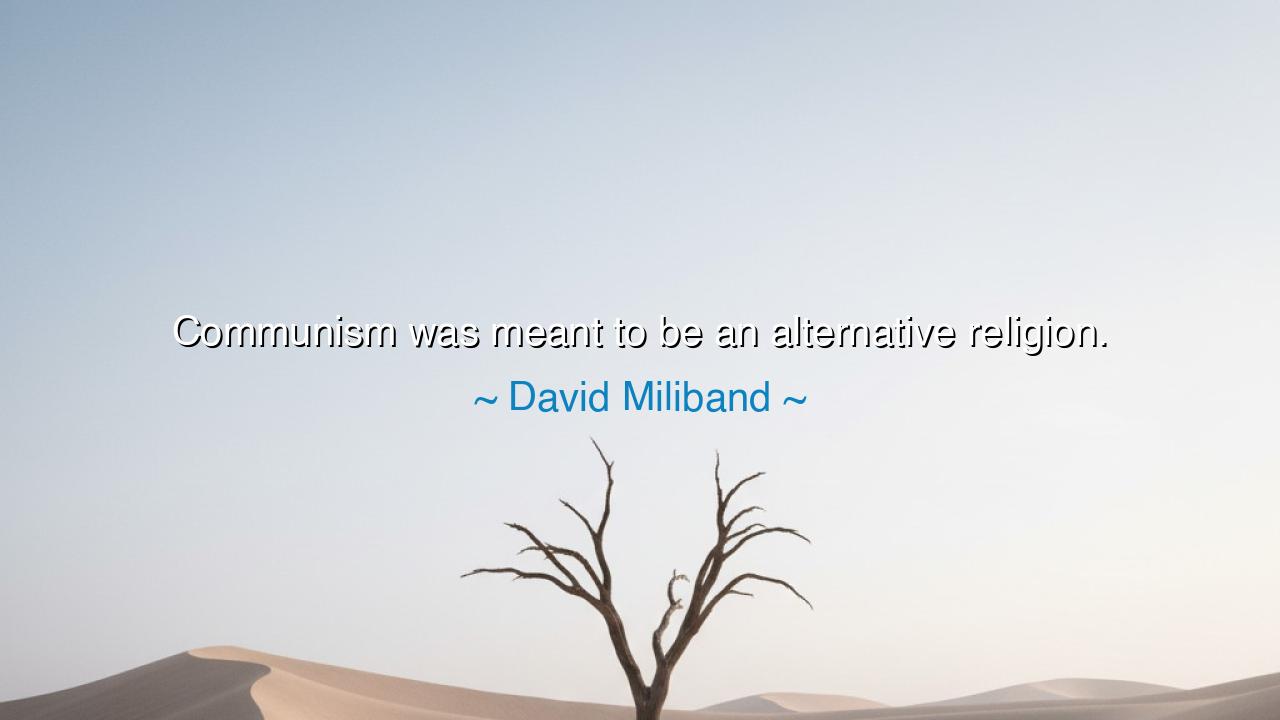
Communism was meant to be an alternative religion.






"Communism was meant to be an alternative religion." These words, spoken by David Miliband, carry within them a deep and provocative reflection on the nature of ideology and faith. In this quote, Miliband suggests that Communism, in its purest form, was not merely a political doctrine or an economic system, but something much more—an attempt to replace traditional religion with a new form of worship. It was, in essence, a belief system that sought to answer the deepest questions of human existence, promising salvation through the collective good, and transcending the limitations of individual spirituality. This view positions Communism as an ideology that was not just concerned with the material but with the metaphysical—offering a vision of the world, a future, and a meaning that paralleled the sacred ideals of faith.
In ancient times, religions were more than just systems of worship; they were complete ways of life. They offered not only a belief in the divine but a guide for how to live, how to relate to others, and how to understand one’s place in the universe. The ancient Greek and Roman gods were invoked not only for favor in war or agriculture but as central figures in the moral and philosophical frameworks that governed society. Similarly, the rise of Christianity in the Roman Empire promised not just spiritual salvation, but a total restructuring of human relationships—between individuals, the state, and the divine. Communism, in the 19th century, sought to fill this same role, promising not just political change, but a revolutionary transformation of society, with Marxism serving as its guiding scripture and Leninism as its prophet.
Karl Marx, the architect of Communist thought, famously declared that religion was the “opium of the people,” a tool used by the ruling classes to keep the oppressed in check. Yet, in his writings, Marx also proposed a new religion—one that would guide humanity toward its true emancipation. This religion would be grounded not in faith in the divine but in a belief in the material world and the potential of humanity to build a better, more just society. In this sense, Communism was not just a political ideology but a worldview that sought to replace religion as the central focus of human life. It proposed that, rather than salvation through faith, salvation would come through the collective efforts of the people to overthrow the oppressive systems of capitalism and build a new world based on equality and justice.
The history of Communism in practice, particularly during the 20th century, demonstrates the extent to which it came to resemble a religion in its own right. Under the regimes of Stalin, Mao, and others, Communist leaders were not merely politicians; they were elevated to the status of cult figures, revered and worshipped by the masses. Stalin’s image was omnipresent in the Soviet Union, his words treated as scripture, and his authority unquestioned. Mao Zedong, in China, was similarly revered as a god-like figure, his thoughts enshrined as the guiding principles of the nation. The state, under these leaders, was not just a political entity; it became the supreme force in the lives of individuals, much like a religious institution. Communism thus morphed from an ideological system into a totalizing worldview, where the state became the highest authority and Marxist principles were treated with the same reverence as sacred texts.
Yet, as with many religions, Communism faced its own contradictions. It promised a utopia of equality and freedom, yet in practice, it often led to tyranny, oppression, and violence. The Russian Revolution of 1917, for all its ideals of liberation, gave rise to one of the most brutal regimes in history. Stalin's purges, the forced collectivization of agriculture, and the Great Famine showed the dark side of this ideological faith, where dissent was ruthlessly suppressed, and the people were forced to worship the state and its ideology, rather than finding true freedom. In this way, the Communist state became a false religion, promising salvation but delivering only suffering. The lesson from this tragic history is clear: no ideology, whether religious or political, can be allowed to assume absolute power without inevitably corrupting itself.
The lesson for us today is to recognize the danger of ideologies that seek to replace faith with a rigid set of beliefs and practices. Communism, as an alternative religion, demonstrates the temptation of ideologies that promise a perfect world but demand blind loyalty and sacrifice from those who follow them. While it is important to seek systems that promote justice, equality, and human dignity, we must also be vigilant against the dangers of dogma, whether religious or political. The true spiritual path lies not in the worship of an ideology or a leader, but in the pursuit of truth, compassion, and understanding—values that transcend any one system or belief.
Let us take this lesson to heart and resist the allure of ideologies that promise salvation but demand unquestioning faith. Let us instead strive for a world where freedom of thought, individual dignity, and compassion are the guiding principles. In doing so, we honor the true potential of human beings—not to be subjugated to a political or religious order, but to create a world based on justice, freedom, and human flourishing. May we always remember that while ideas can shape our world, it is our actions and our hearts that determine the future.






AAdministratorAdministrator
Welcome, honored guests. Please leave a comment, we will respond soon